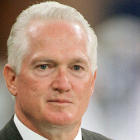Seahawks coach Pete Carroll revealed on Monday in his season-ending press conference that a new contract for quarterback Russell Wilson is a part of the offseason agenda. 2019 is the final year of the four-year, $87.6 million contract extension Wilson signed at the start of training camp in July 2015. He is scheduled to make $17 million in his contract year.
Wilson arguably had his best season operating the NFL's most run-oriented offense in which the Seahawks exceeded expectations by earning a playoff berth as a wild card after a massive offseason roster overhaul. He set career highs with 35 touchdown passes (tied for third in the NFL) and a 110.9 passer rating (third) although his 427 pass attempts were his fewest since 2013. Wilson threw only seven interceptions, which tied his career low.
Carroll, who recently signed his own extension running through the 2021 season, didn't indicate a timetable for Wilson's deal. Impending free agents, such as defensive end Frank Clark, will be a higher signing priority.
Current NFL salary standards
Any deal Wilson signs will likely set new standards in most major contract metrics. The financial benchmarks of key contract metrics that should be relevant to Wilson's contract discussions are listed below.
Average Yearly Salary: $33.5 million (Aaron Rodgers, Packers)
Overall Contract Guarantees: $100 million (Matt Ryan, Falcons)
Fully Guaranteed At Signing: $94.5 million (Ryan)
Fully Guaranteed Within 12 Months: $100 million (Ryan)
Signing Bonus: $57.5 million (Rodgers)
Three-Year Cash Flow: $102.5 million (Rodgers)
First Three New Years: $108.5 million (Rodgers)
The top of the quarterback market increased by almost 25 percent during 2018, with multiple quarterbacks taking turns as the NFL's highest-paid player. The 49ers got the ball rolling by signing Jimmy Garoppolo to a five-year extension averaging $27.5 million per year last February after only five impressive starts following a midseason trade from the Patriots, rather than designate him as a franchise player. Kirk Cousins received the NFL's first lucrative fully-guaranteed veteran contract averaging $28 million per year ($84 million over three years) from the Vikings at the start of free agency. Ryan became the NFL's first $30-million-per-year player in the spring. Rodgers raised the bar with his preseason extension.
The amount fully guaranteed at signing jumped by more than 60 percent. The benchmark before Ryan was Matthew Stafford at $60.5 million in the five-year, $135 million extension the Lions gave him in 2017, which made the NFL's highest-paid player at $27 million per year.
Watch Saturday's and Sunday's playoff games on fuboTV, try it for free, and stream Chargers-Patriots and all the CBS games on CBS All Access.
Professionals within the industry (agents and team negotiators) typically value deals by new money, which is the amount of compensation in a contract excluding what a player was scheduled to make before receiving a new deal. For example, Rodgers had two years remaining on his existing contract with $20.4 million and $21.1 million salaries for 2018 and 2019 prior to his signing. Although Rodgers signed a six-year contract for $175.5 million, his deal is considered as a four-year, $134 million extension averaging $33.5 million per year among industry professionals. His two existing contract years for $41.5 million are subtracted from the $175.5 million six year total to arrive at this number.
Rodgers also has $4 million in salary escalators and incentives to make the extension worth as much as $138 million. The $4 million isn't considered as part of the base value of the deal.
Compensation in the first three new years is the amount of money in a contract exclusive of what a player was scheduled to make before receiving a new deal, just like with new money when determining average yearly salary. The cash flow analysis looks at the compensation in its totality. The focus is on the amount of money received in the first three years of a contract regardless of whether it's considered as new money. Both metrics have the same dollar amount when a player signs a new contract as a free agent or when his contract is set to expire.
Overall contract guarantees can be misleading. A complete picture of a contract's true security isn't given by this metric. The amount of money fully guaranteed at signing and will become fully guaranteed early in the contract are the best and most accurate measures of security.
This aspect of NFL contracts began to receive more public scrutiny thanks to Colin Kaepernick's six-year extension in 2014 worth a maximum of $126 million. On the surface, it appeared as if the 49ers made a huge financial commitment to Kaepernick because of the overall value of the deal and the $61 million in guarantees. Kaepernick's contract didn't provide him the same level of security as comparable quarterback deals since only a little less than $13 million was fully guaranteed at signing. Those deals had approximately $40 million completely secure, which was essentially triple Kaepernick's amount.
If you still haven't marked your calendar for the Super Bowl, the game will be kicking off from Atlanta on Feb. 3 and will be televised by CBS and you can stream it right here. If you're thinking about buying a new TV for the big game, CNET has you covered. They shared their best picks for every budget.
Wilson's leverage
Wilson will hold most of the cards in negotiations, unlike in 2015, when he was entering the final year of his rookie deal. At the time, Wilson had made just under $2.2 million from his playing contract. This dynamic was going to make it extremely difficult for Wilson to reject an offer with a fairly player friendly structure putting him near the top of the NFL pay scale. The Seahawks made him the league's second-highest paid player at $21.9 million per year despite the Legion of Boom defense being the strength of the team. Wilson has demonstrated he can carry the offense for extended periods of time since signing his extension, notwithstanding the run oriented approach this season.
Wilson has made just over an additional $72 million from his current contract. This financial security will allow Wilson to play hardball in the upcoming negotiations.
The franchise-tag game
The Seahawks didn't do themselves any favors in the long run by restructuring Wilson's contract for salary-cap purposes during the 2017 season. Wilson's 2019 cap number increased by almost $2.1 million to $25,286,766. At a minimum, it will be $30,344,119 to put a non-exclusive franchise tag on Wilson in 2020 under the 20-percent increase over the prior year's salary (typically cap number) provisions for this designation.
An exclusive franchise tag would seem more likely since it would prohibit Wilson from soliciting an offer sheet from other NFL teams. Most quarterbacks receive the exclusive designation. The calculation is different from the non-exclusive version. An exclusive designation for Wilson would be the average of the top five 2020 quarterback salaries when the restricted free-agent signing period ended, which would be about a week before the 2020 NFL Draft. This number currently projects to $30.86 million. A second franchise tag in 2021 at a 20 percent increase over Wilson's 2020 franchise number would be $37.032 million. A third franchise tag in 2022 with a 44 percent increase over the 2021 figure would be exorbitant. It would be slightly over $53.25 million.
Cousins created a new blueprint for players to follow when given a franchise tag. The quarterback betting on himself during the 2016 and 2017 seasons by embracing the franchise tag led to his fully-guaranteed contract.
The interest in a new deal is mutual, but embracing the franchise tag, like Cousins did, could be appealing because of the high salaries, especially if negotiations become acrimonious. Wilson would earn almost $68 million over the two years before likely becoming an unrestricted free agent in 2022, when he is 33, which would make him a year younger than Rodgers was when he signed his current contract. Since good, healthy quarterbacks who should still have several highly productive years still ahead of them almost never hit the open market, Wilson could practically name his price by going this route.
How a deal gets done
There probably isn't a deal that can be made without Seattle accepting the reality of the franchise-tag dynamic. It wouldn't be surprising for Mark Rodgers, Wilson's agent, to initially base an offer on Wilson getting franchised for a third time, although it hasn't happened since the three-franchise-tag limitation was implemented in the 2006 Collective Bargaining Agreement (CBA). Wilson would stand to make just under $121.25 million with the franchise tags. If used as a guide by Rodgers, his first offer to the Seahawks would be in excess of $40 million per year.
Seattle is probably going to need to offer Wilson an extension that re-sets the NFL pay scale for him to forego playing the franchise-tag game. Rodgers is primarily a baseball agent, who is more comfortable taking players to the open market than the typical football agent.
All of Seattle's lucrative veteran contracts signed under the 2011 CBA have been structured where the guaranteed money consists of base-salary guarantees and a signing bonus. Base-salary guarantees after the first contract year are for injury only, initially at signing, in most instances but typically become fully guaranteed either on the fifth day of the waiver period in each specific year or five days after the start of the waiver period. The waiver period always begins the day after the Super Bowl.
The second contract year was fully guaranteed at signing, which has become customary around the league for high-end contracts, in several deals negotiated prior to 2013. Players receiving a fully-guaranteed second year base salary included defensive tackle Red Bryant, defensive end Chris Clemons, running back Marshawn Lynch, defensive tackle Brandon Mebane, tight end Zach Miller, wide receiver Sidney Rice and center Max Unger.
The Seahawks moved away from this concept with wide receiver Percy Harvin's contract in 2013. The extensions cornerback Richard Sherman and safety Earl Thomas signed in 2014 were structured like Harvin's.
Seattle may need to return to its old practice and make other structural concessions, consistent with the NFL's richest contracts, for Wilson. Guarantees in the third contract year typically vest a year early in February or March of the second contract year rather than when the year is actually approaching. In other words, Wilson's 2021 contract year would become fully guaranteed at the beginning of the 2020 waiver period. Ryan's first three contract years were fully guaranteed at signing, which is something Wilson's camp surely recognizes. It might also be a necessity for any fourth-year guarantee in 2022 to vest either in 2020 or 2021. Stafford's $6 million fourth-year guarantee in 2020 will vest on the fifth day of the 2019 league year, which is this upcoming March 17.
It may be not a matter of whether Wilson becomes the NFL's first $35-million-per-year player but how far he gets above this mark. There could be upwards to $125 million in overall guarantees, if not fully guaranteed at signing, should Wilson choose to exploit his leverage.





















